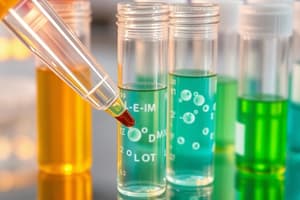Podcast
Questions and Answers
What are the key components that define laboratory quality?
What are the key components that define laboratory quality?
Laboratory quality is defined by accuracy, reliability, and timeliness of reported test results.
Why might a 99% accuracy level be considered insufficient in laboratory results?
Why might a 99% accuracy level be considered insufficient in laboratory results?
A 1% error can lead to significant issues, considering the potential impact of even minor inaccuracies in testing.
Identify two negative consequences that can arise from laboratory errors.
Identify two negative consequences that can arise from laboratory errors.
Unnecessary treatment and delayed diagnosis are two negative consequences of laboratory errors.
How can inaccurate laboratory results impact health outcomes?
How can inaccurate laboratory results impact health outcomes?
What is necessary to minimize errors in laboratory processes?
What is necessary to minimize errors in laboratory processes?
Why is a quality management system model significant in laboratories?
Why is a quality management system model significant in laboratories?
In what manner can laboratory errors influence diagnostic testing?
In what manner can laboratory errors influence diagnostic testing?
How might laboratory errors contribute to increased costs in healthcare?
How might laboratory errors contribute to increased costs in healthcare?
What is a crucial outcome of achieving high accuracy and reliability in laboratory testing?
What is a crucial outcome of achieving high accuracy and reliability in laboratory testing?
What is one of the challenges encountered in laboratory measurements?
What is one of the challenges encountered in laboratory measurements?
Flashcards are hidden until you start studying
Study Notes
Laboratory Quality
- Defined by accuracy, reliability, and timeliness of reported test results.
- 99% accuracy is often insufficient in laboratory testing due to potential consequences of even a 1% error.
Consequences of Laboratory Errors
- Unnecessary treatments may arise from incorrect results, leading to patient harm and adverse effects.
- Delays in correct diagnosis can significantly impede effective patient care.
Impact on Health Outcomes
- Inaccurate laboratory results can result in improper treatments, adversely affecting patient health.
- Delays in diagnosis can prevent timely intervention, worsening health conditions.
Minimizing Laboratory Errors
- Essential to execute all laboratory processes and procedures to the highest standards.
- Consistency in best practices is crucial for reducing the incidence of errors.
Importance of Quality Management System
- A comprehensive quality management system fosters good laboratory performance by evaluating the entire operation.
- Ensures adherence to standards and protocols, enhancing overall quality in testing.
Effect on Diagnostic Testing
- Laboratory errors can necessitate additional and often unnecessary diagnostic tests, complicating patient care.
- Increased complexity in diagnosis can lead to higher patient anxiety and resource consumption.
Cost Implications of Laboratory Errors
- Laboratory errors elevate costs through unnecessary treatments and additional testing.
- Increased personnel effort due to rectifying errors can strain laboratory resources.
Achieving Accuracy and Reliability
- High accuracy and reliability in test results are crucial for optimal health outcomes.
- Dependable testing directly influences the quality of care patients receive.
Challenges in Laboratory Measurements
- Acknowledgment of inherent inaccuracies in measurements is critical, as some degree of error is unavoidable.
- Continuous improvement and technology adoption are essential to mitigate measurement issues.
Studying That Suits You
Use AI to generate personalized quizzes and flashcards to suit your learning preferences.




